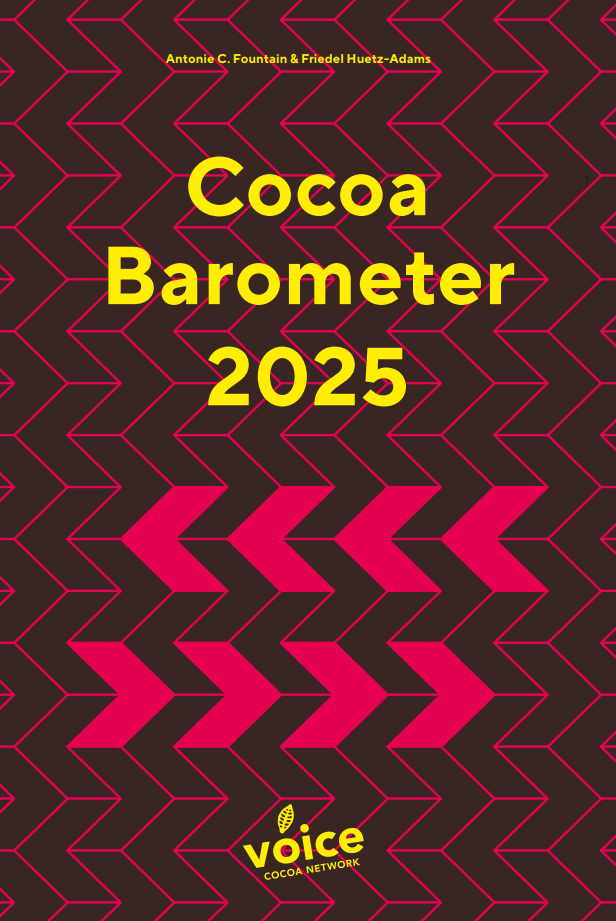This 8 October, the VOICE Network, a broad coalition of civil society organisations including Rikolto, launched the Cocoa Barometer 2025. The Barometer lays bare the contradictions of today’s cocoa sector: record prices on global markets, yet deepening poverty for those at the start of the chain. It traces decades of progress and setbacks and calls on all actors in the cocoa sector to take urgent, coordinated action.
As the Barometer paraphrases Max Roser of Our World in Data: “three things are true at once for the cocoa sector: it is in a bad place, it is in a lot better place than it was, and it can be a lot better still.”
Despite the current price boom, millions of cocoa farmers remain trapped in poverty. Crop failures, climate shocks, and unfair contracts mean that the profits from high prices rarely reach those who grow the beans. Farmer poverty, the Barometer stresses, lies at the root of nearly every major challenge in cocoa, from deforestation and child labour to gender inequality.
Meanwhile, cocoa-driven deforestation is expanding into new regions in Latin America and Central Africa, threatening biodiversity hotspots. Without careful management, the current boom could turn into a new cycle of oversupply and price collapse, echoing the 2016 crisis.
Cocoa growing communities remain under the tightening grip of climate change, deforestation, and human rights abuses. 1.5 million children remain in hazardous cocoa labour in Ghana and Côte d’Ivoire. Women, who do most of the farm work, are still excluded from decision-making and profits.

“Living incomes for farmers and halting deforestation are not luxuries. They are the only way to safeguard the future of the cocoa sector.”
The Barometer is the go-to publication for all things related to cocoa & sustainability, and calls for urgent action from the entire sector, amongst others to
• Pay fairly: commit to living incomes for farmers
• Protect forests: enforce a global moratorium on cocoa-driven deforestation
• Recognise farmers, women and men, as co-decision makers
• Be transparent: implement transparency and accountability mechanisms across supply chains.

The Cocoa Barometer 2025 highlights that promising initiatives exist: stronger collaboration, unprecedented regulation, and new models for sustainable trade show that systemic change is possible.
Also at Rikolto, we’ve been involved in partnerships in the cocoa sector that demonstrate that sustainable trade is not idealism, but smart business.
Since October 2024, all standard Boni Selection chocolate tablets sold by Colruyt Group are sourced through a direct, transparent supply chain co-developed with Fairtrade, Puratos, and Rikolto. This partnership guarantees a living income for cocoa farmers in Côte d’Ivoire by paying fair prices, signing long-term contracts, and investing in cooperative strengthening.
Beyond fair pricing, the initiative supports diversification and agroforestry, helping farmers to grow additional crops that improve household resilience while reducing pressure on forests. Impact is carefully monitored, with attention to income growth, gender equality, and child labour prevention.
This model proves that retailers can play an active role in transforming cocoa value chains. It makes the sustainable option the only option for consumers, embeds sustainability into commercial practice, and the model can be replicated by others.
.jpg)
Fair prices alone cannot fix a system built on unequal power relations. Change means that farmers should be included as co-decision makers in the policies that shape their livelihoods. While this sounds evident, it is not. As the Cocoa Barometer indicates, cocoa farmers all too often have no seat at the table.
In Ghana, Rikolto plays a facilitation role in the Wassa Amenfi West Multi-Stakeholder Platform, established through the Community-Based Adaptation to Climate Change (CCAM) and Wassa Amenfi Cocoa Landscape Initiative (WACLI) projects. Together with Preferred by Nature (PbN), Rikolto has brought together 59 members from 27 stakeholder groups, including local authorities, farmer cooperatives, major cocoa buyers such as Ferrero and Touton, and traditional leaders. The diversity of participants ensures that decisions and strategies reflect the perspectives of all key actors within the landscape.

“Farmers are directly represented through leaders selected by farmer cooperatives, producer groups, and community representatives. This approach ensures that farmers’ voices shape the discussions and that proposed interventions remain practical and grounded in their realities.”
Systemic transformation requires a supportive policy environment. The Cocoa Barometer warns that recent political backlash in Europe could undermine hard-won progress on sustainability. Laws like the Corporate Sustainability Due Diligence Directive (CSDDD) and the EU Deforestation Regulation (EUDR) are vital to make companies accountable for protecting human rights and forests.
Yet, these regulations must be implemented fairly. Farmers and producer organisations need financial and technical support to comply and, crucially, a seat at the decision-making table.
The cocoa sector stands at a crossroads: will sustainability remain a side project, or will it become the new norm? For us at Rikolto, the answer is clear.
“The knowledge, partnerships, and models for a fair, sustainable cocoa sector exist. What is needed now is the courage and collective commitment to scale them up.” Abdulahi Aliyu, Global Director of Rikolto’s Sustainable Cocoa and Coffee Programme